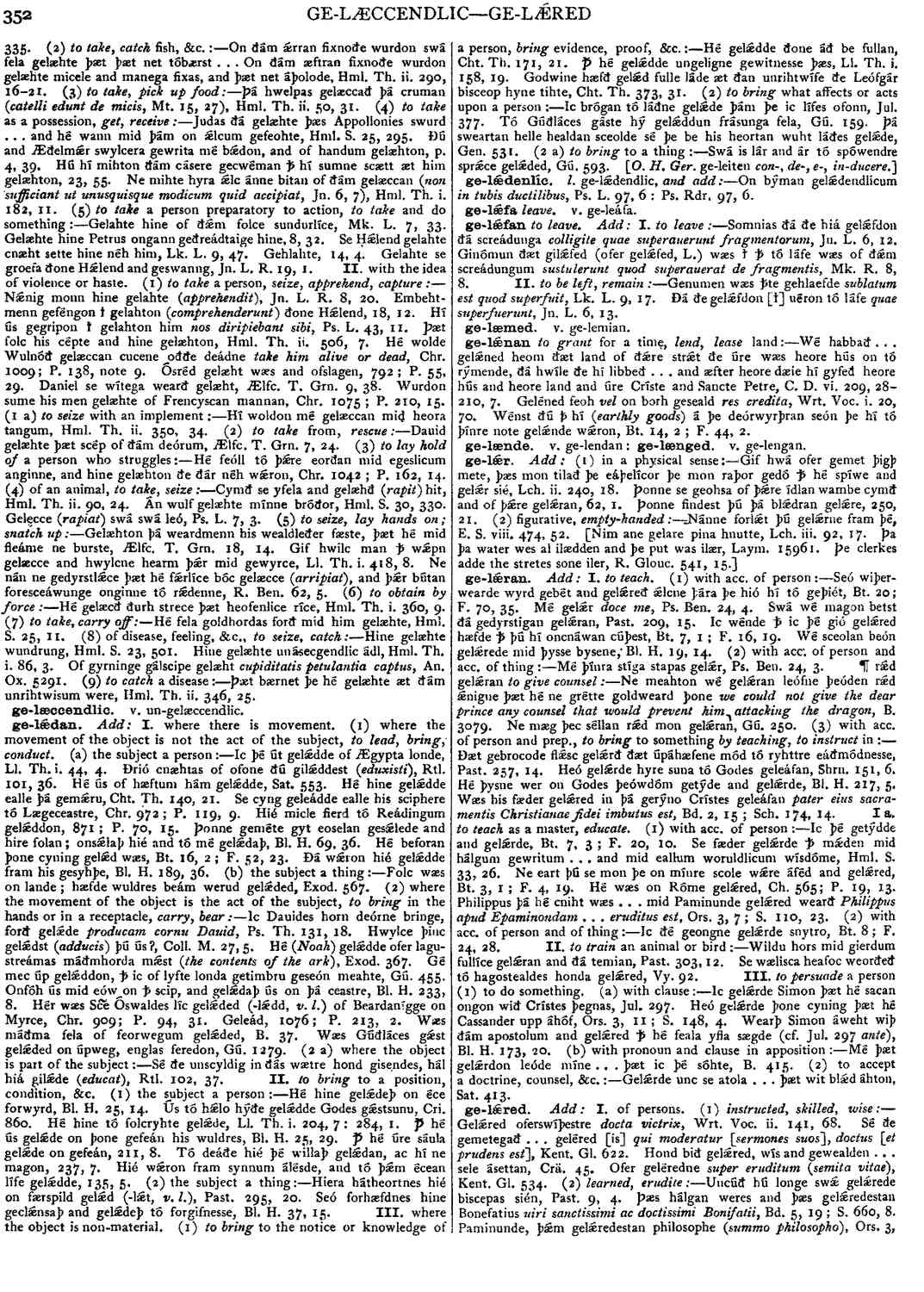ge-lǽdan
-
Ic þé út gelǽdde of Ægypta londe,
- Ll. Th. i. 44, 4.
-
Ðrió cnæhtas of ofone ðú gilǽddest (
eduxisti
),- Rtl. 101, 36.
-
Hé ús of hæftum hám gelǽdde,
- Sat. 553.
-
Hé hine gelǽdde ealle þá gemǽru,
- Cht. Th. 140, 21.
-
Se cyng geleádde ealle his sciphere tó Lægeceastre,
- Chr. 972; P. 119, 9.
-
Hié micle fierd tó Reádingum gelǽddon,
- 871; P. 70, 15.
-
Þonne geméte gyt eoselan gesǽlede and hire folan; onsǽlaþ hié and tó mé gelǽdaþ,
- Bl. H. 69, 36.
-
Hé beforan þone cyning gelǽd wæs,
- Bt. 16, 2; F. 52, 23.
-
Ðá wǽron hié gelǽdde fram his gesyhþe,
- Bl. H. 189, 36.
-
Folc wæs on lande; hæfde wuldres beám werud gelǽded,
- Exod. 567.
-
Ic Dauides horn deórne bringe, forð gelǽde
producam cornu Dauid,
- Ps. Th. 131, 18.
-
Hwylce þinc gelǽdst (
adducis
) þú ús?,- Coll. M. 27, 5.
-
Hé (
Noah) gelǽdde ofer lagustreámas máðmhorda mǽst (the contents of the ark ),
- Exod. 367.
-
Gé mec úp gelǽddon, ꝥ ic of lyfte londa getimbru geseón meahte,
- Gú. 455.
-
Onfóh ús mid eów on ꝥ scip, and gelǽdaþ ús on þá ceastre,
- Bl. H. 233, 8.
-
Hér wæs Sc̃e Óswaldes líc gelǽded (-lǽdd,
v. l.
) of Beardanígge on- Myrce, Chr. 909; P. 94, 31.
-
Geleád,
- 1076; P. 213, 2.
-
Wæs máðma fela of feorwegum gelǽded,
- B. 37.
-
Wæs Gúðláces gǽst gelǽded on úpweg, englas feredon, Gú. 1279. (2 a) where the object is part of the subject :-- Sé ðe unscyldig in ðás wætre bond gisendes, hál hiá gilǽde (
educat
),- Rtl. 102, 37.
-
Hé hine gelǽdeþ on éce forwyrd,
- Bl. H. 25, 14.
-
Ús tó hǽlo hýðe gelǽdde Godes gǽstsunu,
- Cri. 860.
-
Hé hine tó folcryhte gelǽde,
- Ll. Th. i. 204, 7: 284, 1.
-
Ꝥ hé ús gelǽde on þone gefeán his wuldres,
- Bl. H. 25, 29.
-
Ꝥ hé úre sáula gelǽde on gefeán,
- 211, 8.
-
Tó deáðe hié þé willaþ gelǽdan, ac hí ne magon,
- 237, 7.
-
Hié wǽron fram synnum álésde, and tó þǽm écean lífe gelǽdde,
- 135, 5.
-
Hiera hátheortnes hié on færspild gelǽd (-lǽt,
v. l.
),- Past. 295, 20.
-
Seó forhæfdnes hine geclǽnsaþ and gelǽdeþ tó forgifnesse,
- Bl. H. 37, 15.
-
Hé gelǽdde ðone áð be fullan,
- Cht. Th. 171, 21.
-
Ꝥ hé gelǽdde ungeligne gewitnesse þæs,
- Ll. Th. i. 158, 19.
-
Godwine hæfð gelǽd fulle láde æt ðan unrihtwífe ðe Leófgár bisceop hyne tihte,
- Cht. Th. 373, 31.
-
Ic brógan tó láðne gelǽde þám þe ic lífes ofonn,
- Jul. 377.
-
Tó Gúdláces gáste hý gelǽddun frásunga fela,
- Gú. 159.
-
Þá sweartan helle healdan sceolde sé þe be his heortan wuht láðes gelǽde, Gen. 531. (2 a)
to bring
to a thing :-- Swá is lár and ár tó spówendre sprǽce gelǽded,- Gú. 593.
Bosworth, Joseph. “ge-lǽdan.” In An Anglo-Saxon Dictionary Online, edited by Thomas Northcote Toller, Christ Sean, and Ondřej Tichy. Prague: Faculty of Arts, Charles University, 2014. https://bosworthtoller.com/48546.
Checked: 0